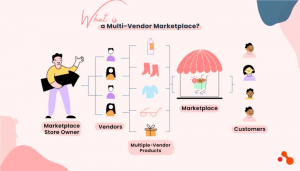A digital tool that enables companies to sell goods or services online is eCommerce software. It serves as the cornerstone of an online store by providing the necessary tools. Such as handling logistics, maintaining inventory, managing products, and improving the user experience.
In today's digital world, eCommerce systems have developed beyond their basic features. To provide a comprehensive retail experience, they interface with accounting, marketing automation, and payment gateways. Such as Shopify, WooCommerce, Magento, BigCommerce, or custom eCommerce software development. And it can be the foundation of your online business, regardless of your size.
Why is eCommerce software essential for retail businesses?
Here are reasons that explain the importance of eCommerce software for retail firms.
Expand your reach
Reach clients anywhere in the world without being constrained by physical retail locations. You can easily expand the audience you want to reach with your business. Sell around the clock and easily enter new markets.
Streamline operations
To save time and cut errors, automate repetitive functions. Therefore, easily streamlines your business functions with smart software. Such as inventory tracking, order supply, and payment harmony.
Gain customer insights
Monitor consumer behavior, check the purchase trend, and adjust your marketing strategy. Therefore, businesses get intensive analysis of their daily tasks. And that too in the light of data-operated insight.
Enhanced customer experience
Provide personal suggestions, easy navigation, and different types of payment methods. And quick checkout procedures to increase customer happiness.
Scale your business
The ecommerce development company allows you to operate easily. And it helps the firms to score easily with development. It also expanded the product catalogs and supported an increase in online traffic.
Key features of eCommerce software
Here are the key features of integrating eCommerce software.
User-friendly interface
The experiences of customers and store administrators are improved with a clear, user-friendly interface. Across the equipment, responsive design guarantees smooth access. The dashboard can be adapted to make products, customers, and orders easier.
Advanced inventory management
In many places, install an alert for sink inventory, low inventory, and monitor stock levels. With a strong warehouse management system built for the best stock control. This enhanced pick and ship efficiency helps tracking.
Efficient order management
Authentically automate important supply operations and keep the order track from placement to delivery. The advantage of this integration with major shipping companies allows rapid distribution.
Essential features:
- Price and promotion management
- Stock and order closing
- Management of vendors and products
Customer relationship management
Use targeted marketing and adaptation to create a permanent relationship. And consumer data to support cross-channel marketing campaigns and loyalty programs. It helps in loyalty, personal analysis, and multichannel advertising.
Powerful analytics & reporting
Get practical knowledge about trends, opportunities, and performance measures. It provides sophisticated and on-demand reports to track KPI and improve strategy. In addition, monitoring the data after earnings and sales.
Integrated accounting tools
Use integrated features to maintain financial records, monitor expenses, and cover bills. It helps in making budget, tax computation and bank harmony easier. And it helps in automatic harmony to match the invoice.
eCommerce planning tools
Plan the product introduction effectively, demand, and track the company's expansion. And encourages data-managed decisions by supporting the scheme.
Essential features:
- Setting a budget and forecasting sales
- Report on historical comparisons
Third-party integrations
Easily connect marketing platforms, financial equipment, and logistic companies. Its advantage is compatibility with marketing equipment, payment processors, CRMS, FedEx, UPS, and DHL.
Add-on apps
Extend the functionality with retail point-of-cell (POS), mobile app, or loyalty program ad-on. An add-on market for better back-office, sales, and marketing work.
How to choose the right eCommerce software partner?
Here is how to choose the best software step-by-step.
Assess your needs
Determine your primary requirements, product categories, target market, sales channel, and workforce size.
Set a budget
Include any development or adaptation expenditure, monthly fee, add-on tool, and initial setup.
Evaluate features
Ensure that the program has features such as safe checkouts, mobile adaptation, and product management.
Check Scalability
The platform can develop with your company, allowing you to add new product lines and handle increased traffic.
Review Security Standards
Select a platform that has strong security facilities such as PCI compliance, SSL encryption, and frequent updates.
Test Customer Support
To solve problems immediately, reliable help is necessary. Look for platforms with a useful knowledge base and round-the-clock assistance.
Read Reviews & Case Studies
Learn from the experiences of other companies using the platform. Even their successes and failures provide important information.
Conclusion
eCommerce software is the backbone of your online company, not just a tool. Selecting the appropriate platform can make the difference between failure and success. Platforms enable companies to establish, expand, and thrive in the realm of digital commerce. Especially by providing strong tools, perceptive analytics, and smooth integration possibilities.






